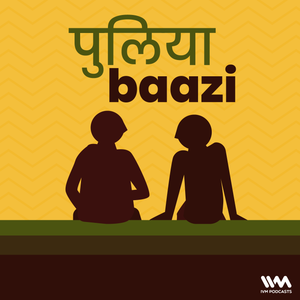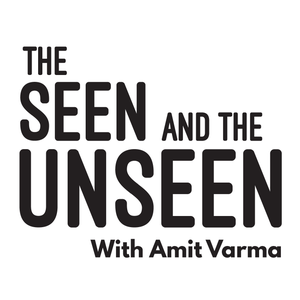
Puliyabaazi Hindi Podcast
IVM Podcasts
This Hindi Podcast brings to you in-depth conversations on politics, public policy, technology, philosophy and pretty much everything that is interesting.
- 55 minutes 12 secondsअमेरिका कर रहा चीन की नकल? Is the US Copying China?
नमस्ते। आपको नए वर्ष की बधाई। नए साल में खुशखबरी ये है कि पुलियाबाज़ीने Mercatus Center की Emergent Ventures ग्रांट जीती है। इससे पुलियाबाज़ी को और बेहतर करने की हमारी कोशिश जारी रह पायेगी। उम्मीद है कि आप नए साल में पुलियाबाज़ी परिवार का हिस्सा बने रहेंगे। तो चलिए, इसी के साथ साल की पहली पुलियाबाज़ी अमरीका की बदलती नीतियों पर। चीन के बढ़ते प्रभाव से अमेरिका को अपने सुपरपावर स्टेटस को खोनेका का डर सता रहा है। दुनिया में globalisation का चैम्पियन अमेरिका चीन की तरह इनवर्ड-लुकिंग नीतियाँ अपनाता दिखाई दे रहा है। ऐसा क्यों? जानने के लिए सुनिए आज की चर्चा:
We discuss:
* The rise of Mercantilism
* Choose your enemies wisely
* Pushback to globalisation
* Resolving trade-offs for an alternate pathway
* A democratic solution to technological progress?
Also, please note that Puliyabaazi is now available on Youtube with video. If you like the work we do, please share it with your friends and family.
Read more on this:
Matsyanyaaya #2: Don’t Copy China by Pranay Kotasthane
Book Recommendations:
India in the Persianate Age: 1000-1765 by Richard M. Eaton
Persepolis I & II by Marjane Satrapi
The Sentinel by Arthur C. Clarke
Related Puliyabaazi:
Topic-wise Puliyabaazi Playlists: Here
If you have any questions for us, please comment here or write to us at [email protected]. If you like our work, please subscribe and share this Puliyabaazi with your friends, family and colleagues.
Website: https://puliyabaazi.in
Hosts: @saurabhchandra @pranaykotas @thescribblebee
Twitter: @puliyabaazi
Instagram: https://www.instagram.com/puliyabaazi/
Subscribe & listen to the podcast on iTunes, Google Podcasts, Castbox, AudioBoom, YouTube, Spotify or any other podcast app.
This is a public episode. If you would like to discuss this with other subscribers or get access to bonus episodes, visit www.puliyabaazi.in9 January 2025, 2:00 am - 47 minutes 26 seconds2024 में हमने क्या सीखा?
२०२४ में पुलियाबाज़ी में कई नए प्रयास हुए। सबस्टैक और नयी वेबसाइट। ‘टिप्पणी’ में हमने हिंदी में लिखना भी शुरू किया। अब श्रोताओं को भी इसमें अपनी टिप्पणीयाँ जोड़ने का निमंत्रण दिया है। (लिंक) इन सब में साल कहाँ निकल गया पता ही नहीं चला। तो हमने सोचा थोड़ा ठहरके ये सोचा जाए कि इस साल में किन नए विचारों ने हमें उत्साहित किया। हमने क्या सोचा, क्या सीखा और क्या जाना। बस फिर क्या। हो गयी और एक पुलियाबाज़ी। आप भी सुनिए और हमें बताइये कि आप के लिए इस साल के बड़े takeways क्या थें?
We discuss:
* Bottlenecks and systems thinking
* Three bottlenecks that India needs to solve
* Bonding capital and bridging capitall
* A toolkit to celebrate Republic Day appropriately.
* Forgotten feminist women from the 19th century
* The story of child-bride turned rebel doctor
Also, do check out our new intro on Youtube. If you like the work we do, please subscribe and share it with your friends and family.
Reading List:
Github Link | A Toolkit to Celebrate Republic Day
Book Review | पंडिता रमाबाई: एक जीवनी. by Khyati Pathak
Book | Rukhmabai: The Life and Times of a Child Bride Turned Rebel-Doctor by Sudhir Chandra
Website | Ideas of India
Recommendations:
Skunk Works: A Personal Memoir of My Years at Lockheed by Ben R. Rich and Leo Janos
The Life and Times of Pandita Ramabai by Uma Chakravarti
Humankind: A Hopeful History by Rutger Bregman
Related Puliyabaazi:
How to celebrate Republic Day? गणतंत्र दिवस कैसे मनाया जाए?
Topic-wise Puliyabaazi Playlists | Link
If you have any questions for the guest or feedback for us, please comment here or write to us at [email protected]. If you like our work, please subscribe and share this Puliyabaazi with your friends, family and colleagues.
substack:
Website: https://puliyabaazi.in
Hosts: @saurabhchandra @pranaykotas @thescribblebee
Twitter: @puliyabaazi
Instagram: https://www.instagram.com/puliyabaazi/
Subscribe & listen to the podcast on iTunes, Google Podcasts, Castbox, AudioBoom, YouTube, Spotify or any other podcast app.
This is a public episode. If you would like to discuss this with other subscribers or get access to bonus episodes, visit www.puliyabaazi.in12 December 2024, 2:00 am - 1 hour 31 minutesनई वाली हिंदी कहानियाँ। The Art of Storytelling ft. Divya Prakash Dubey
इस हफ़्ते पुलियाबाज़ी की मुलाकात हो रही है स्टोरीबाज़ी के साथ। आज हमारे ख़ास मेहमान हैं मशहूर हिंदी लेखक और कहानीकार दिव्य प्रकाश दुबे जिन्होंने कई बेस्टसेलिंग नवलकथाएँ लिखी हैं, स्टोरीटेलिंग के शो भी करते हैं, और फिल्मों में डायलॉग भी लिखे हैं। हिंदी साहित्य जगत में अपनी जगह बनाने के इस सफर को वो आज इस सहज बातचीत में शेयर करते हैं। दिव्य प्रकाश नये ज़माने में उभरती हुई नयी हिंदी के लेखक हैं। नये पुराने किस्सों और यादों से भरी ये पुलियाबाज़ी आप को ज़रूर पसंद आएगी। सुनियेगा ज़रूर।
We discuss:
* The art of storytelling
* Adapting storytelling for different mediums
* Nayi Hindi
* The challenge with using Hindi for technical topics
* The literary ecosystem in Hindi
* Is algorithm the new gate keeper?
Reading List:
अब पुलियाबाज़ी में आप भी शामिल हो सकते हैं। इस तरह।
Send your Hindi submissions to Puliyabaazi. For details see the link here.
Related Puliyabaazi:
भारत, एक भाषा संगम। How have Indian languages evolved? ft. Karthik Venkatesh
हिंदी-उर्दू : इतिहास और राजनीतिकरण. Hindi Urdu Unity ft. Abhishek Avtans
Puliyabaazi Playlist on Indian Languages
If you have any questions for the guest or feedback for us, please comment here or write to us at [email protected]. Please note that Puliyabaazi is now available on Youtube with video. If you like our work, please subscribe and share this Puliyabaazi with your friends, family and colleagues.
Website: https://puliyabaazi.in
Guest: @divyapdubey
Hosts: @saurabhchandra @pranaykotas @thescribblebee
Twitter: @puliyabaazi
Instagram: https://www.instagram.com/puliyabaazi/
Subscribe & listen to the podcast on iTunes, Google Podcasts, Castbox, AudioBoom, YouTube, Spotify or any other podcast app.
This is a public episode. If you would like to discuss this with other subscribers or get access to bonus episodes, visit www.puliyabaazi.in5 December 2024, 2:00 am - 50 minutes 52 secondsचीन की आर्थिक सफलता के मूलभूत कारण।
चीन की आर्थिक सफलता के पीछे कई विशेषज्ञ विभिन्न सेक्टरों में बेहतरी या इनोवेशन के अलग-अलग कारण बताते हैं। लेकिन क्या हम कुछ मूलभूत कारण सोच सकते हैं जो सभी क्षेत्रों में चीन की आर्थिक सफलता को समझा सकें? आज की पुलियाबाज़ी पर हम इस विषय पर सोच विचार करते हैं। और पिछले हफ्ते की चर्चा में कुछ तार अगर छूट गए हो तो उनको भी जोड़ने की कोशिश करते हैं, ताकि चीन की पॉलिटिक्स और इकोनॉमिक्स पर हमारी समझ और सटीक हो पाए। आप भी सुनिए और बताइए कि क्या आप हमारे विश्लेषण से सहमत हैं या नहीं। तो सुनिए आज की पुलियाबाज़ी।
We discuss:
* Local governance model in China
* Authoritarian, yet decentralized
* Focus on universal primary education
* Land ownership in China
* Lessons for India
Also, please note that Puliyabaazi is now available on Youtube with video. If you like the work we do, please share it with your friends and family.
Reading List:
Global Policy Watch: Explaining China’s Political Economy by Pranay Kotasthane
Related Puliyabaazi:
भारत और चीन के बदलते रिश्ते। Decoding India-China relations ft. Vijay Gokhale
https://www.puliyabaazi.in/p/decoding-india-china-relations-ft-a75
भारत और चीन में रोटी, कपड़ा, मकान। Comparing India-China Consumption Trends
https://www.puliyabaazi.in/p/comparing-india-china-consumption
If you have any questions for the guest or feedback for us, please comment here or write to us at [email protected]. If you like our work, please subscribe and share this Puliyabaazi with your friends, family and colleagues.
substack:
Website: https://puliyabaazi.in
Hosts: @saurabhchandra @pranaykotas @thescribblebee
Twitter: @puliyabaazi
Instagram: https://www.instagram.com/puliyabaazi/
Subscribe & listen to the podcast on iTunes, Google Podcasts, Castbox, AudioBoom, YouTube, Spotify or any other podcast app.
This is a public episode. If you would like to discuss this with other subscribers or get access to bonus episodes, visit www.puliyabaazi.in28 November 2024, 2:18 am - 52 minutes 23 secondsभारत और चीन में रोटी, कपड़ा, मकान। Comparing India-China Consumption Trends
भारत चीन को पीछे छोड़ते हुए दुनिया में सबसे ज़्यादा आबादी वाला देश बन गया है। लेकिन उपभोक्ताओं की बड़ी जनसँख्या के बावजूद क्यों भारत विदेशी निवेशकों को आकर्षित करने में पीछे छूट रहा है? इस सवाल का जवाब ढूंढने के लिए आज हम नज़र डालेंगे भारत और चीन के कंसम्पशन ट्रेंड्स पर। इस हफ़्ते पुलियाबाज़ी पर हमारे मेहमान हैं तक्षशिला इंस्टीट्यूशन से जुड़े स्टाफ रिसर्च एनालिस्ट अमित कुमार, जो भारत और चीन की खपत पर अपनी रिसर्च हमारे साथ साझा करते हैं। आइये, आप भी शामिल हो जाईये इस चर्चा में।
India has surpassed China as the most populous country in the world. With a large base of consumers, shouldn’t India be an attractive destination for foreign investors? However, we see that despite the West’s emerging China+1 policy, India is losing the race to smaller economies in Southeast Asia. Why is that the case? This week on Puliyabaazi, Amit Kumar, Staff Research Analyst at the Takshashila Institution, joins us to share his research on India-China consumption trends.
We discuss:
* Why do we need to look at consumption data?
* Who are consumers?
* How does the consumer population in India compare with China?
* How do consumption trends change as an economy matures?
* Why is India not able to attract investors despite its large consumer base?
* Is there any silver lining for India?
Also, please note that Puliyabaazi is now available on Youtube with video. If you like the work we do, please share it with your friends and family.
Reading List:
India-China consumption comparison by Amit Kumar
India is well placed to become the 'next China' and drive global growth by Amit Kumar
Weekend Long Read: Can India Become the World’s Next Manufacturing Powerhouse?
Related Puliyabaazi:
भारत और चीन के बदलते रिश्ते। Decoding India-China relations ft. Vijay Gokhale
https://www.puliyabaazi.in/p/decoding-india-china-relations-ft-a75
EP250 समस्या रोज़गार या वेतन की? Reducing Regulatory Cholesterol ft. Manish Sabharwal
https://www.puliyabaazi.in/p/ep250-reducing-regulatory-cholesterol
If you have any questions for the guest or feedback for us, please comment here or write to us at [email protected]. If you like our work, please subscribe and share this Puliyabaazi with your friends, family and colleagues.
substack:
Website: https://puliyabaazi.in
Guest: @am_i_t_kumar
Hosts: @saurabhchandra @pranaykotas @thescribblebee
Twitter: @puliyabaazi
Instagram: https://www.instagram.com/puliyabaazi/
Subscribe & listen to the podcast on iTunes, Google Podcasts, Castbox, AudioBoom, YouTube, Spotify or any other podcast app.
This is a public episode. If you would like to discuss this with other subscribers or get access to bonus episodes, visit www.puliyabaazi.in21 November 2024, 2:03 am - 41 minutes 26 secondsसफ़रनामा: मेम्फिस से शारजाह से वियतनाम तक। Travelogue: Memphis, Sharjah, Vietnam
हम सफर क्यों करते हैं? जब हम अपने घर या शहर में रहते हैं, तो एक ही नज़रिये से दुनिया को देखने की आदत पड़ जाती है। सफर हमें मौका देता है कि हम अपने पुराने चश्मे उतारकर, दुनिया को एक नए नज़रिये से देखने की कोशिश करें। सफर का मतलब ही यह होता है कि हम अपनी आम ज़िन्दगी की उलझनों को थोड़ी देर के लिए भूलकर कुछ नया ढूंढने निकलें।
अक्सर हमें यह पता नहीं होता कि सफर में क्या मिलेगा, इसलिए अपनी आंखें और मन खुले रखने पड़ते हैं। जो ऐसा कर पाता है, उसे कुछ कीमती यादें और कभी-कभी नए विचारों के बेशकीमती मोती भी मिल सकते हैं। आशा है कि इस सफरनामे में हम जो ख्याल साझा रहे हैं, उनमें से आपको भी कुछ काम की बातें मिलें।
We discuss:
* Saurabh’s travel to Memphis
* Upcoming change in Manufacturing
* Sharjah Book Fair
* Pranay’s book ‘When Chips Are Down’ translated into Arabic
* Vietnam’s female labour force
* Archeological Survey of India collaborating in Vietnam
Also, please note that Puliyabaazi is now available on Youtube with video. If you like the work we do, please share it with your friends and family.
Related Puliyabaazi:
सफ़रनामा: अमरीका से थाईलैंड से केन्या तक। Travelogue from US, Thailand, Kenya
If you have any questions for the guest or feedback for us, please comment here or write to us at [email protected]. If you like our work, please subscribe and share this Puliyabaazi with your friends, family and colleagues.
Website: https://puliyabaazi.in
Hosts: @saurabhchandra @pranaykotas @thescribblebee
Twitter: @puliyabaazi
Instagram: https://www.instagram.com/puliyabaazi/
Subscribe & listen to the podcast on iTunes, Google Podcasts, Castbox, AudioBoom, YouTube, Spotify or any other podcast app.
This is a public episode. If you would like to discuss this with other subscribers or get access to bonus episodes, visit www.puliyabaazi.in14 November 2024, 2:00 am - 1 hour 13 minutesभारतीय कंपनियाँ रिसर्च में पीछे क्यों? Is India Investing in Research? ft. Varun Aggarwal
पुलियाबाज़ी पर चर्चा में अक्सर ये बात उठती है कि भारत वैज्ञानिक संशोधन में दुसरे देशों की तुलना में कमज़ोर है। पर ऐसा क्यों? इस विषय पर पहले भी FAST, India और Change Engine के को-फाउंडर वरुण अग्गरवाल के साथ पुलियाबाज़ी हुई है। चर्चा को काफ़ी समय हो गया तो हमने सोचा कि इन वर्षों में रिसर्च और इनोवेशन की दुनिया में क्या बदलाव आये हैं इस पर और एक पुलियाबाज़ी हो जाये। पिछली चर्चा में फोकस था सरकारी तंत्र द्वारा प्रोत्साहित संशोधन, और इस बार चर्चा का केंद्र है भारतीय कंपनियों में हो रहा (या कहिये नहीं हो रहा) अनुसंधान। अगर आपने इसके पहले की चर्चा सुनी न हो तो वो भी सुनियेगा। आपके ज्ञान में बढ़ोतरी ही होगी ये गारंटी है।
Why does India lag in R&D? We have discussed this topic earlier with Varun Aggarwal, Co-founder, Fast, India and Change Engine. It has been a while since that discussion, so we thought that it would be good to have an update on this topic. The focus in the last discussion was on the research funded by the governments and universities, while in this episode the focus is on the R&D ecosystems within the corporate sector. We strongly recommend you to listen to the previous episode also, if you haven’t already done so.
Also, please note that Puliyabaazi is now available on Youtube with video. If you like the work we do, please share it with your friends and family.
Readings:
State of Industry R&D in India by FAST India
Related Puliyabaazi:
भारत को इनोवेटिव कैसे बनाये? Making India a Research Power ft. Varun Aggarwal
रोशनी का तकनीकी इस्तेमाल। Applied Photonics ft. Sonali Dasgupta
If you have any questions for the guest or feedback for us, please comment here or write to us at [email protected]. If you like our work, please subscribe and share this Puliyabaazi with your friends, family and colleagues.
substack:
Website: https://puliyabaazi.in
Guest: @varaggarwal
Hosts: @saurabhchandra @pranaykotas @thescribblebee
Twitter: @puliyabaazi
Instagram: https://www.instagram.com/puliyabaazi/
Subscribe & listen to the podcast on iTunes, Google Podcasts, Castbox, AudioBoom, YouTube, Spotify or any other podcast app.
This is a public episode. If you would like to discuss this with other subscribers or get access to bonus episodes, visit www.puliyabaazi.in7 November 2024, 3:44 am - 1 hour 11 minutesडेटा द्वारा भारत को कैसे समझें? Understanding India through Data ft. Rukmini S
Welcome to another edition of Puliyabaazi! In today’s episode, we dive into the world of data journalism with noted data journalist Rukmini S. She is the founder of Data for India, a public platform aimed at uncovering new insights about India through data. In this conversation, we discuss the current landscape of data journalism in India. Has the quality of Indian data improved over time? What challenges still exist? Can we consider data to be the singular truth, or is it just one point in triangulating our understanding of the world? Join us for this insightful conversation!
पुलियाबाज़ी के एक और संस्करण में आपका स्वागत है! आज हम डेटा जर्नलिज्म की दुनिया में गोता लगाने की कोशिश करेंगे डेटा पत्रकार रुक्मिणी एस के साथ। वे डेटा फॉर इंडिया की संस्थापक हैं, जो एक सार्वजनिक मंच है डेटा के ज़रिए भारत को बेहतर समझने के लिए। वे हमें भारत में डेटा जर्नलिज्म के परिदृश्य के बारे में बताती हैं। क्या समय के साथ भारतीय डेटा में सुधार हुआ है? क्या हम डेटा को आखिरी सत्य मान कर चल सकते हैं? या डेटा दुनिया को समझने की खोज में एक सीढ़ी मात्र है? आशा है आपको ये चर्चा पसंद आएगी।
We discuss:
* What is Data Journalism?
* India’s Statistical Systems
* Sample Surveying
* Challenges with public data in India
* We have Data!
* How data can be misleading
* Complexity behind the numbers
* Triangulating different data sources
* Measuring India's poverty
* Beware of Data Misrepresentation
Readings:
Whole Numbers and Half Truths: What Data Can and Cannot Tell Us About Modern India by Rukmini S
Related Puliyabaazi:
डेटा शोषण से बचे कैसे | Save yourself from data exploitation
महिला श्रमिक और अर्थव्यवस्था The Indian Women Labour Force
If you have any questions for the guest or feedback for us, please comment here or write to us at [email protected]. If you like our work, please subscribe and share this Puliyabaazi with your friends, family and colleagues.
Website: https://puliyabaazi.in
Guest: @Rukmini
Hosts: @saurabhchandra @pranaykotas @thescribblebee
Twitter: @puliyabaazi
Instagram: https://www.instagram.com/puliyabaazi/
Subscribe & listen to the podcast on iTunes, Google Podcasts, Castbox, AudioBoom, YouTube, Spotify or any other podcast app.
This is a public episode. If you would like to discuss this with other subscribers or get access to bonus episodes, visit www.puliyabaazi.in31 October 2024, 2:00 am - 50 minutes 59 secondsलोकसभा सीटों का बंटवारा कैसे हो? Delimitation: Opportunity for a Grand Bargain
एक वोट, एक मूल्य ये प्रजातंत्र का मूल सिद्धांत है। इसी बात को ध्यान में रखते हुए, बदलती जनसंख्या के साथ लोकसभा की सीटों का बंटवारा भी बदलने की व्यवस्था हमारे संविधान में की गयी थी। हर दशकीय जनगणना के बाद जनसंख्या के अनुपात में सीटों का बंटवारा होना था। लेकिन, इमरजेंसी के दौरान इस व्यवस्था को पच्चीस सालों के लिए स्थगित कर दिया गया। २००१ में इस बंटवारे को २०२६ तक टाल दिया गया। अब २०२६ नज़दीक आ रहा है। इसके साथ ही जिन राज्यों में जनसँख्या घटी है, उन राज्यों में लोकसभा के सीटें कम हो जाने का डर एक राजकीय मुद्दा बनकर उभर रहा है। इस ज्वलंत मुद्दे को कैसे समझें? क्या हम किसी समाधान पर पहुँच सकते हैं? चलिए, इसी पर आज की पुलियाबाज़ी करते हैं।
One vote, one value is the basic principle of democracy. Hence, Article 81 of the Indian Constitution mandated a regular redistribution of Lok Sabha seats with changing population. After every decennial census, seats were to be reallocated amongst states in proportion to the population, so that the weight of every vote remains more or less the same across the country. However, during the Emergency, this exercise was postponed for twenty-five years. In 2001, it was further postponed till 2026. Now, as 2026 is approaching, delimitation has become a political issue especially in the southern states which stand to lose seats owing to their reduced population. What can be the potential solutions to this? How can we reallocate seats so that we respect the ‘One Vote, One Value’ principle, while improving overall governance?
We discuss:
* One person, one vote
* Historical background
* Concentration of political power
* The extent of malapportionment
* Alternatives for new apportionment
* Can actual voters be a criteria for seat apportionment?
* Possible solution
* Strengthening the Upper House
* Vertical Devolution
Please Note: Puliyabaazi is also available on Youtube in Video format. Please check out Puliyabaazi Hindi Podcast Youtube channel if you have not done so.
Readings:
India’s Emerging Crisis of Representation by Milan Vaishnav and Jamie Hintson
The States in Parliament by Lalit Panda and Ritwika Sharma, Vidhi Centre for Legal Policy
TSATU: Shruti Rajagopalan Dives Into Delimitation
Related Puliyabaazi:
संसद को सुदृढ़ कैसे करें? Strengthening India’s Parliament Ft. M. R. Madhavan
संसद के अंदर. Understanding the Indian Parliament.
If you have any questions for the guest or feedback for us, please comment here or write to us at [email protected]. If you like our work, please subscribe and share this Puliyabaazi with your friends, family and colleagues.
substack:
Website: https://puliyabaazi.in
Hosts: @saurabhchandra @pranaykotas @thescribblebee
Twitter: @puliyabaazi
Instagram: https://www.instagram.com/puliyabaazi/
Subscribe & listen to the podcast on iTunes, Google Podcasts, Castbox, AudioBoom, YouTube, Spotify or any other podcast app.
This is a public episode. If you would like to discuss this with other subscribers or get access to bonus episodes, visit www.puliyabaazi.in24 October 2024, 2:00 am - 1 hour 5 minutesसुपर कीटाणुओं का कैसे करें मुकाबला? Understanding Superbugs and Antibiotic Resistance ft. Anirban Mahapatra
एंटीबायोटिक की खोज मानव जाति के लिए एक महत्वपूर्ण क्षण था। इससे इंसानों का जीवनकाल बढ़ा और स्वास्थ्य सेवा में क्रांतिकारी बदलाव आया क्योंकि लोग अब मामूली चोटों और संक्रमणों के कारण नहीं मर रहे थे। लेकिन अब एक नया खतरा मंडरा रहा है - सुपरबग बैक्टीरिया अब तक खोजे गए एंटीबायोटिक्स के प्रति तेजी से प्रतिरोधी होते जा रहे हैं। एंटीबायोटिक प्रतिरोध को तेजी से बढ़ाने वाले कारण क्या हैं? इस छिपी हुई महामारी को रोकने के लिए क्या किया जा सकता है? माइक्रोबायोलॉजिस्ट और ‘व्हेन द ड्रग्स डोंट वर्क’ के लेखक अनिर्बान महापात्रा इस विषय को सरल बनाने और एंटीबायोटिक्स के उपयोग और दुरुपयोग से जुड़े कई मिथकों को तोड़ने के लिए हमारे साथ इस पुलियाबाज़ी पर जुड़ें। आप भी गौर से सुनिए और अगर बातें काम की लगें तो अपने परिवारजनों के साथ साझा करें।
The discovery of antibiotics was a pivotal moment for humankind. Lifespan increased and healthcare was revolutionized as people were no longer dying due to minor injuries and infections. But now, there is a real danger of losing the evolutionary arms race with superbug bacterias, who are increasingly becoming resistant to the antibiotics we have discovered so far. What are the causes that’s fast tracking antibiotic resistance? What can be done to arrest this hidden pandemic? What should policymakers do? Anirban Mahapatra, microbiologist and author of ‘When The Drugs Don’t Work’, joins us to simplify this topic and bust the many myths that surround the use and misuse of antibiotics.
We discuss:
* What are superbugs?
* Bacterias are everywhere
* Overuse of antibiotics
* How does antibiotic resistance develop?
* Horizontal Gene Transfer
* Moore’s law vs Eroom’s law
* Myths about antibiotics use
* Antibiotics in agriculture and poultry farming
* What should be the policy response?
* Market failure in drug discovery
Readings:
When The Drugs Don’t Work: The Hidden Pandemic that Could End Modern Medicine by Anirban Mahapatra
Related Puliyabaazi:
मानसिक आरोग्य और हम. Importance of Mental Health.
प्रयोगशास्त्र : रैण्डमाइस्ड कंट्रोल ट्रायल की कहानी. Understanding RCTs.
If you have any questions for the guest or feedback for us, please comment here or write to us at [email protected]. If you like our work, please subscribe and share this Puliyabaazi with your friends, family and colleagues.
Website: https://puliyabaazi.in
Guest: @bhalomanush
Hosts: @saurabhchandra @pranaykotas @thescribblebee
Twitter: @puliyabaazi
Instagram: https://www.instagram.com/puliyabaazi/
Subscribe & listen to the podcast on iTunes, Google Podcasts, Castbox, AudioBoom, YouTube, Spotify or any other podcast app.
This is a public episode. If you would like to discuss this with other subscribers or get access to bonus episodes, visit www.puliyabaazi.in17 October 2024, 2:00 am - 1 hour 8 minutesWhy is India’s Real Estate Market Broken? शहरों में घरों की कमी क्यों ft. Vaidehi Tandel
Why is the housing market in India so expensive? Why is buying a house a decision fraught with risk and uncertainty? How can we find clues about the nexus between the builders and the politicians? This week, we speak to Vaidehi Tandel, an urban economist, who has researched into the issues that plague India’s housing market.
भारत में घर इतने महंगे क्यों है? घर खरीदना जोखिम और अनिश्चितता से भरा फैसला क्यों है? बिल्डरों और राजनेताओं के बीच सांठगांठ के बारे में सुराग कैसे मिलेंगे? इस सप्ताह पुलियाबाज़ी पर हमारे साथ जुडी अर्बन अर्थशास्त्री वैदेही टंडेल, जिन्होंने भारत के रियल एस्टेट को प्रभावित करने वाले मुद्दों पर शोध की है। वे मैनचेस्टर यूनिवर्सिटी में अर्बन इकोनॉमिक्स और रियल एस्टेट के विषय पढ़ाती हैं।
We discuss:
* Magical cities
* Why are cities more productive?
* Are Indian cities dense?
* How to improve housing supply?
* Issues with FSI constraints
* Is the CBD-centric model good or bad?
* Why are our urban areas dilapidated?
* Vacant lands in cities
* Litigations in Real Estate
* Lemons in Housing Market
* Impact of RERA
* Real Estate in China
* Rationalisation of building codes
Readings:
Do Mandatory Disclosures Squeeze the Lemons? The Case of Housing Markets in India by Vaidehi Tandel, Sahil Gandhi, Anupam Nanda & Nandini Agnihotri
Building networks: Investigating the quid pro quo between local politicians & developers by Vaidehi Tandel, Sahil Gandhi and Alex Tabarrok
Too slow for the urban march: Litigations and the real estate market in Mumbai, India by Sahil Gandhi, Vaidehi Tandel, Alex Tabarrok and Shamika Ravi
Related Puliyabaazi about Cities and Urbanisation:
भारत का भविष्य हमारे शहर तय करेंगे। Managing India’s Cities ft. Devashish Dhar, Author
एक अच्छे शहर का मतलब क्या है? Urbanisation Done Right.
If you have any questions for the guest or feedback for us, please comment here or write to us at [email protected]. If you like our work, please subscribe and share this Puliyabaazi with your friends, family and colleagues.
substack:
Website: https://puliyabaazi.in
Guest: @VaidehiTandel
Hosts: @saurabhchandra @pranaykotas @thescribblebee
Twitter: @puliyabaazi
Instagram: https://www.instagram.com/puliyabaazi/
Subscribe & listen to the podcast on iTunes, Google Podcasts, Castbox, AudioBoom, YouTube, Spotify or any other podcast app.
This is a public episode. If you would like to discuss this with other subscribers or get access to bonus episodes, visit www.puliyabaazi.in10 October 2024, 2:00 am - More Episodes? Get the App
Your feedback is valuable to us. Should you encounter any bugs, glitches, lack of functionality or other problems, please email us on [email protected] or join Moon.FM Telegram Group where you can talk directly to the dev team who are happy to answer any queries.
 The Seen and the Unseen - hosted by Amit Varma
The Seen and the Unseen - hosted by Amit Varma
 3 Things
3 Things
 Daily Dose
Daily Dose
 ThePrint
ThePrint
 In Focus by The Hindu
In Focus by The Hindu
 Cyrus Says
Cyrus Says